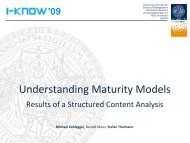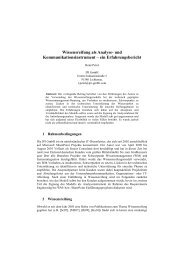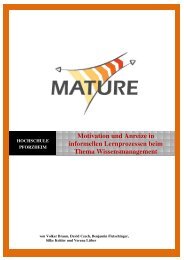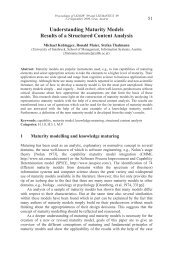MATURE Deliverable 1. - Knowledge Maturing
MATURE Deliverable 1. - Knowledge Maturing
MATURE Deliverable 1. - Knowledge Maturing
You also want an ePaper? Increase the reach of your titles
YUMPU automatically turns print PDFs into web optimized ePapers that Google loves.
48<br />
Figure 13: Dimensions of knowledge maturing<br />
• The knowledge dimension refers to knowledge in a narrow sense, i.e., domain knowledge in a<br />
non-tangible form, including “know-what” and “know-how”. <strong>Knowledge</strong> in this understanding is<br />
always bound to people’s minds – everything beyond that is an abstraction. This dimension<br />
represents the main domain described with the first maturing model where knowledge was<br />
understood differently on the individual and the collective level:<br />
o Individual level. On an individual level, we follow the assumption that knowledge is<br />
bound to individuals’ minds and their structures. The process of augmenting and<br />
changing that knowledge is what is usually called (individual) learning processes. There<br />
are manifold forms of learning and their adequacy depends on the type of knowledge, the<br />
individual, and the situation at hand. One special form of learning (which is often not<br />
explicitly considered as learning) here is also the alignment to the understanding of others<br />
of the same real-world phenomenon.<br />
o Collective level. The collective knowledge level is an abstraction if we “zoom out” from<br />
an individual to a (larger) group of people. From this meso and macro perspectives 7 , we<br />
can speak of collective knowledge as an aggregation of individual pieces of knowledge.<br />
From this meso- or macro-level, we can (despite the fuzziness of aggregation) see if an<br />
individual learning process contributes to an advancement of the collective knowledge<br />
level, which is what we call knowledge maturing. While learning at an individual level<br />
is always the prerequisite for any advancement on the collective level, there is a<br />
fundamental difference if an individual just learns what others have learnt before (e.g.,<br />
like a pupil at school) or if this learning is an active construction process that advances<br />
knowledge on a higher level. We call this “higher level” the collective level. This has a<br />
quality of its own while still acknowledging that it is an abstraction from the sum of<br />
individual knowledge. This also corresponds to the notion of a shared understanding of a<br />
collective. Such a collective does not necessarily refer to a global level, but can also refer<br />
to smaller collectives like an organisation (macro level) or a team (meso level).<br />
Development on this collective is what knowledge maturing in its narrower sense is<br />
referring to.<br />
7 Depending on the size of the organisational unit (macro stands for the entire organisation, e.g., a company,<br />
whereas meso denotes any organisational level within, e.g., a work group, a project or a department.







